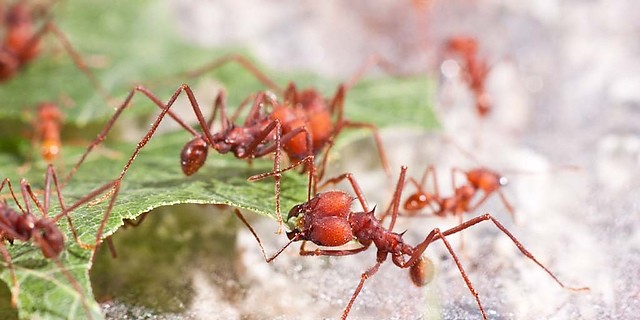
Secrets of fungus-growing
Leafcutter ants are an impressive example of the astonishing types of behaviour that evolution has produced. These small insects practise "agriculture". They cut leaves from trees and, as if they were working on a production line, carry snippet after snippet of these leaves down into their subterranean nests. The ants grow certain types of fungus on this plant material and feed off it. A colony of seven million worker ants can take up a space of 600 cubic metres and process around as much plant material as a cow. An international consortium of researchers has now been able to demonstrate for the first time that this highly specialized habit has been deposited in the genetic make-up of leafcutter ants and has, for example, caused certain genes otherwise necessary for digestion to be missing. Scientists from Münster University are the only German participants involved in the study.
Led by Cameron Currie from the University of Wisconsin-Madison in the USA, the 20 working groups involved have for the first time analysed the complete genome of the species of leafcutter ant known as Atta cephalotes. The only non-American working group in the consortium is the team led by Prof. Erich Bornberg-Bauer from Münster University's Institute of Evolution and Biodiversity. The team's speciality is analysing protein fragments, so-called "domains", and a year ago it was already involved in the internationally acclaimed analysis of the genome of the parasitic jewel wasp Nasonia. The new study has been published in the current issue of the journal Public Library of Science (PLoS) Genetics.
"The genome tells us quite a lot about the evolutionary history of ants in the last 30 to 50 million years – and that's probably how long the fungus has been grown," explains Erich Bornberg-Bauer. As a result of the abundant supply of food, leafcutter ants could afford to lose some of the genes that play an important role in the metabolism of other insects. This means that the ants no longer produce certain digestive enzymes, which have become superfluous because the digestion of fungus products does not require any proteins to be broken down. The ants' larvae have also lost the ability to produce certain amino-acids. "Our assumption is that the fungus provides these acids, making it no longer necessary for the ants to produce them themselves."
The key to this "genome streamlining" is in the symbiotic lifestyle of the leafcutter ants. The insects live in a network of mutual ecological dependencies. Numerous castes of worker ants which differ extremely from one another optimize the fungus-growing through a precise division of labour. This includes huge warriors, for example, that defend the colony with its fungus. There are also tiny gardeners who look after the fungus with their delicate mandibles, or gatherers whose speciality is bringing in the leaves.
The fungus is often attacked by another parasitic fungus. However, the ants take precautions – they carry certain bacteria on their bodies and feed them with a gland secretion. The bacteria, for their part, help to keep the fungal gardens free from parasitic fungi. Other bacteria use the fungal gardens as a basis for food and, in return, provide the fungi and the ants with nitrogen. As a result, the ants have developed not only a kind of agriculture but also highly specialized hygienic measures. At the same time, however, they have developed a dependency – without fungus the colonies would perish.
The genetic basis for the division into castes is still a puzzle. "But as a result of the analysis of the genome it's likely that we will soon gain new insights into this, too," suspects Bornberg-Bauer. Scientists assume that so-called epigenetics play a major role, in other words that certain parts of the genome are "deactivated" as a result of environmental influences. Scientists aim to be able draw further conclusions on the causes of the success enjoyed by this species by analysing the genomes of further ant species.
